Ridley Scott sheds ‘light’ on the archives
_1.jpg)
Sir Ridley Scott
One of the largest archives the History of Advertising Trust holds is from JWT London covering from 1922 to 2007. The archive comprises all manner of fascinating content including JWT Client files,
and some from the British Market Research Bureau, with evidence of the creative thinking briefs and meeting notes behind some of the campaigns. The JWT Collection has been catalogued and work is ongoing at HAT to digitise more content making it more accessible to the industry, researchers and students across the world.
HAT have been working closely with JWT London over the last year to develop an in-house exhibition for the agency highlighting some of the newly discovered special documents from the early days of commercial TV when JWT were very much leaders in TV advertising. Head of Creative and TV at JWT at the time was Jeremy Bullmore and one of the Memos he wrote to JWT Producers on 29th December 1965 has been of particular interest :
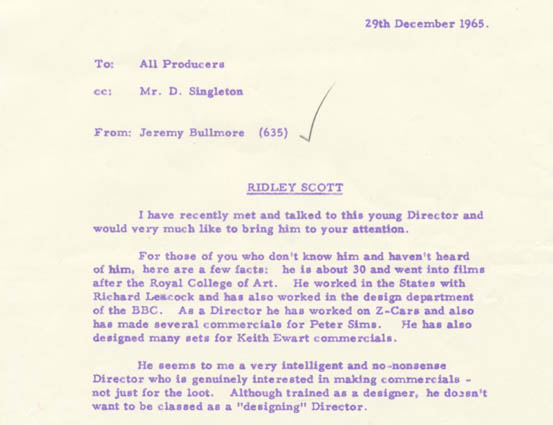 A memo from Jeremy Bullmore, 1965
A memo from Jeremy Bullmore, 1965
Interviewed on camera by HAT in late 2015, Jeremy was delighted to elaborate more on the writing of this Memo and what he thought of the young Ridley Scott.
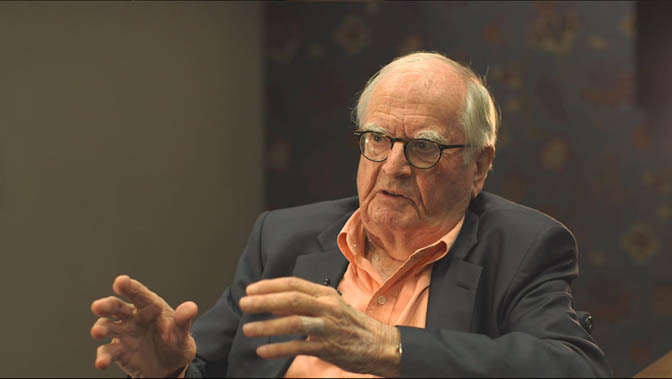 Jeremy Bullmore speaking to HAT in 2015
“He had a very strong visual sense they [the ads] were stunningly made, so precise and attention to every frame. …….I thought I’d been in the presence of somebody very conscientious, very professional but there was no air of “I’m the next Orson Welles” – it was his manner and what he said that made me think he was a conscientious, perfectionist.”
Jeremy Bullmore speaking to HAT in 2015
“He had a very strong visual sense they [the ads] were stunningly made, so precise and attention to every frame. …….I thought I’d been in the presence of somebody very conscientious, very professional but there was no air of “I’m the next Orson Welles” – it was his manner and what he said that made me think he was a conscientious, perfectionist.”
Jeremy confessed he didn’t really remember this particular Memo until HAT caught up with him some 50 years later.
“But”, says Jeremy,
“I knew he had gone on to do greater things of course but I’d absolutely forgotten that I had recommended our Producers look at him with interest – I have never taken credit for his great works…...…….I shall, from now on, of course!”
Keen to expand on the archive and discover more about his early days in the industry around the time of this Memo, HAT approached Sir Ridley. Despite his busy schedule, he was delighted to meet us to contribute to the archives and share the benefit of his experience with aspiring creatives. JWT featured the interview in a short film they produced about Ridley’s early career which was shown at their exhibition launch in December 2016.
In front of the camera, Ridley was soon into reminiscing about his early days as a student -
“I was at the Royal College which was as good as it gets, and at the Royal College there was no film school but in the final year, for Post Graduates, there was a school department which was fundamentally called Theatre & TV Design – which meant Set Design – so I thought if I can do that as an extra curriculum course I’d be one step closer to at least maybe being an Art Director in television or film.”
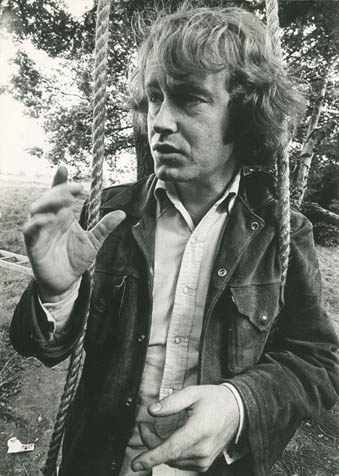 A young Ridley Scott, c1970s (Campaign Archive)
A young Ridley Scott, c1970s (Campaign Archive)
Ridley was a conscientious student and made the most of his place at the Royal College where life was seriously competitive. In a classroom of 40, he was one of a few from the North of England and, whilst most students would disappear home to work on their new tasks, Ridley would stay in the classroom and respond to the competition.
“They left you to it…..so when you were briefed on the next task, graphic design work, the room would clear and I would not see anybody for 3 weeks – I sat in there every day doing my little thing on my drawing board with maybe 4 other people from Leeds and Sunderland and most of it was like that [pretends to cover his work with his arm] all hidden and I learnt that competition started right there – London students were such competitive mother fuckers it was unbelievable – that’s where I learnt about that – don’t show your work ‘til you’re ready and there was competition, very competitive.”
A chance find of a Bolex camera, complete with instruction booklet and light meter in a cupboard at the Royal College gave Ridley the opportunity to make his first film. Ridley remembers the RCA’s George Haslam who was also a Designer at Teddington Lock at the time and gave the keen, young student permission to borrow the camera on condition he produced a script. Ridley responded to the challenge.
“I took off with a little bloke who was my little brother, little guy called Tony Scott and I made a film with Tony in Redcar , Stockton on Tees – called ‘Boy on a Bicycle’ [actually ‘Boy and Bicycle’] which ran half an hour, cost £65 and that fundamentally is now at the BFI in the archives – it’s a good film*”
Ridley also persuaded John Barrie to do all the music for free!
“It’s amazing what you can do as a student – you gotta have the cheek of the devil – and the learning curve was about doing it yourself.”
Fresh from the Royal College of Art, Ridley headed to the BBC as Set Designer and at this time also came across commercial Director, Keith Ewart who gave him more work.
“So I moonlighted while at the BBC by working for the opposition doing commercial sets. I was on the magic salary [at the BBC] of £1,200 a year - insanely hard work for such little money.”
But he was learning all the time
“In the early years I learnt to be very organised and very frugal. At the BBC I learnt about budgets and learnt to make decisions quickly and stop pondering and stop fucking about – I learnt that”
As a freelancer, he would get £100 a day and was making lots of commercials. After 3 years at the Beeb, he left to go freelance.
“And the freelance took me into a really very busy world …..I got a lot of work as an Art Director and the next thing is the agencies noticed this so you have Jeremy Bullmore, you have Graham Terry you have Jim Garrett start to meet me and “let’s chat about your directing”.”
And Ridley’s memory of meeting Jeremy?
“I remember meeting a man who seemed to be very public school, cos I’m from Nelson Terrace Secondary Mod school in Stockton-on-Tees and I thought this guy’s really posh.”
Jeremy was suitably impressed and JWT subsequently asked Ridley to film a commercial for a new soap powder...
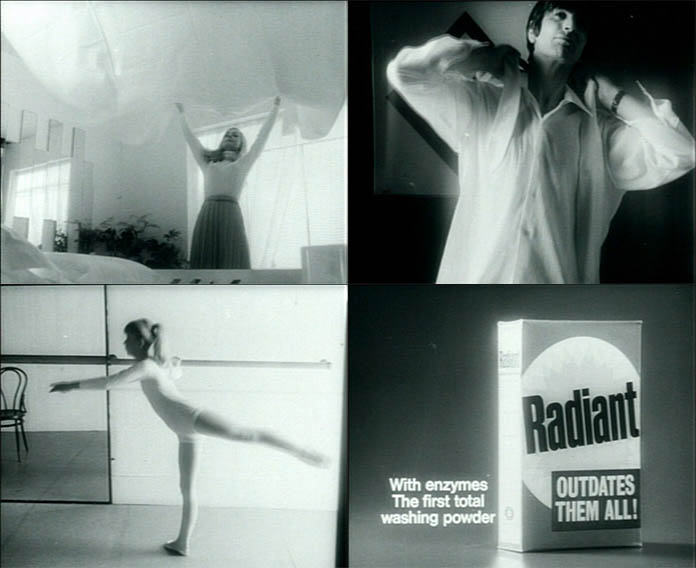
Stills from 1968 Radiant TV commercial produced by JWT
”The soap powder was Radiant” Ridley remembers,
“I was very much booked and known for my visual sense because I would operate everything myself and I would use only two cameramen at the time – there’d be Derek Vanlint and there would be Frank Tidy – those were my two favourite guys. Frank found this wonderful light called a ‘north’ light so everything was beautiful – soft light and I was gradually pushing the envelope, I think I was the first one to push the envelope into making lighting look as if it was shot on location.”
Working too with Keith Ewart, Ridley would observe his lighting techniques very carefully
“Keith used the big comb light which he’d got from Irving Penn – he’d brought that technique from America where you got this beautiful ‘american’ light. We evolved, I think I was probably one of the spearheads, me and Adrian Lyne, Parker later. I think it was us, we were pushing this what they called the ‘english’ light, we were very light conscious, I was very light conscious. I got an immense amount of work just because of my lighting awareness, I wasn’t a cameraman, but because of my awareness.”
But the first commercial he ever did was for Gerber Baby Foods for Peter Simms and Graham Terry (Young & Rubicam) and Ridley remembered Peter Simms sitting behind him while he directed the commercial with the baby screaming and yelling –
“I kind of loved it, I loved the whole experience”
It was Ridley’s focus on making a film as opposed to a commercial which gave him the valuable experience.
Ridley was 27 when he founded Ridley Scott Associates in 1968 - but it was not all smooth sailing.
“I took the money and blew the entire amount by starting my own company. I took a building down in Lexington Street, I decorated it, I put furniture in and all that stuff and I took the chance on it just working – naively nothing happened for 6 weeks the phone didn’t ring. None of my buddies came for my new company, I sat there for 6 weeks and nobody came!”
But it was Captain Birdseye who, it seems, saved the day
“A guy came out of nowhere and said –“We’ve got Captain Birdseye” – I said “I’ll do it”, he said “wait a minute, you don’t know what the script is” – I said “I really don’t care, I’ll do it!” So that was an endorsement for me that the company was going to be OK ‘cos there were 5 Captain Birdseye and I went to Barbados and it was bam!”
RSA became more and more successful
“It grew so fast that I already thought, naively, that I thought a film was going to be round the corner by the time I was 30” – his brother Tony and Hugh Hudson joined him and RSA developed a ‘stable’ of Directors -
“thoroughbreds, of course!”, Ridley adds.
But making films was always his ultimate goal…
“But you know – when you’re having that much success and you’re loving what you’re doing I never even thought about it. I didn’t even think about it ‘til I was about 38 and I thought “Christ I’d better do this quick before it’s too late””
It was the film ‘The Duellists’**, an historical drama starring Keith Carradine and Harvey Keitel in which Ridley made his directorial debut in 1977. The film did well. It won the Best Debut Film award at the Cannes Film Festival the same year.
Ridley remembers:
“It did well critically although it was criticised for being too pretty, too this, too many filters – infact there were no filters on the film at all – it rained for 58 days – it pissed down 58 days and that was the filter!”
With such a focus on directing so many box office hit movies over the years Ridley’s interest in current commercial production is still keen.
“Advertising is always going to change its forms – there was a time when I was doing commercials where there was a joke that commercials– breaks were the things you watched and you went into the kitchen when the programmes resumed cos the commercial advertising was better than the show – right?
Now we’ve changed, I think the importance of what I call really clever copywriting doesn’t exist – I think it is more a corporate thinking and generic corporate thinking to sell a product working from a demographic which fundamentally makes a lot of advertising today really boring – sorry! You can look at mine at 30 years old and everything is entertaining and it sells the product”
Ridley was in no doubt about the value of looking back at the industry’s archives and the work the History if Advertising Trust does to preserve and provide access to it all.
With ‘Alien : Covenant’ due out this May and a long list of successful films to his credit made over 40 years, Ridley is one of the most admired and successful Directors of all time. But he doesn’t forget his special ‘film school’, the world of British TV advertising which provided him with such a platform to develop his talents - as he remembers:
“ I lay everything at the feet of commercial advertising and what I learnt from that”.
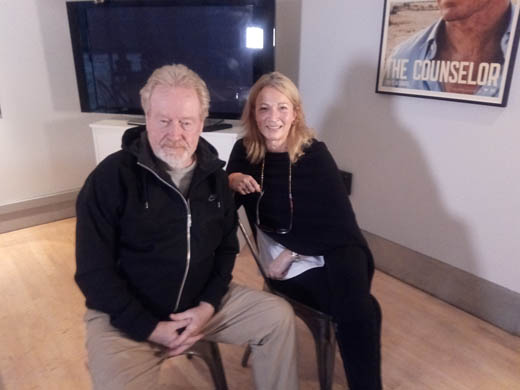 Ridley Scott with HAT's Jane Jarvis
Ridley Scott with HAT's Jane Jarvis
Interview and article: Jane Jarvis – History of Advertising Trust
Filming – JWT London
With thanks to Sir Ridley Scott and RSA
*Watch ‘Boy and Bicycle’ 1965 on the
BFI Player
** ‘The Duellists’ is being screened on 12th March 2017 at the
Curzon , Soho as part of the IPA’s
Festival of British Advertising celebrating the 100th Anniversary of the IPA which will run from the 9th - 12th of March at the Old Truman Brewery, Brick Lane, London. Footage from this interview by HAT’s Jane Jarvis with Ridley will be shown at the Curzon as he talks more about how he got to make the film.
See:
http://adfest100.co.uk/events/from-adland-to-hollywood-sir-ridley-scott-on-advertising-an-exclusive-film-and-screening/
February 2017
« All News Articles